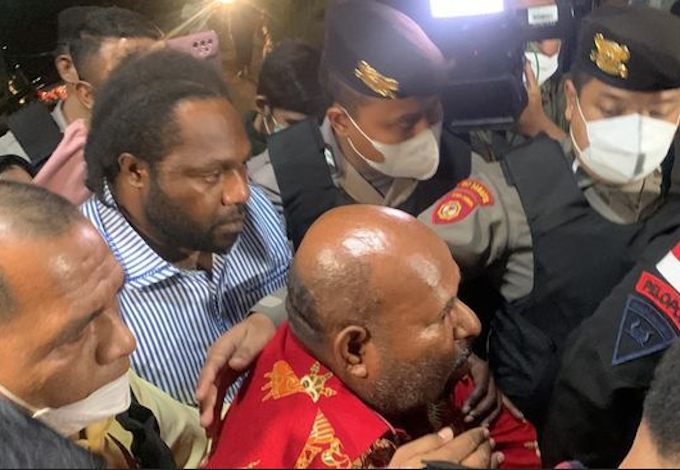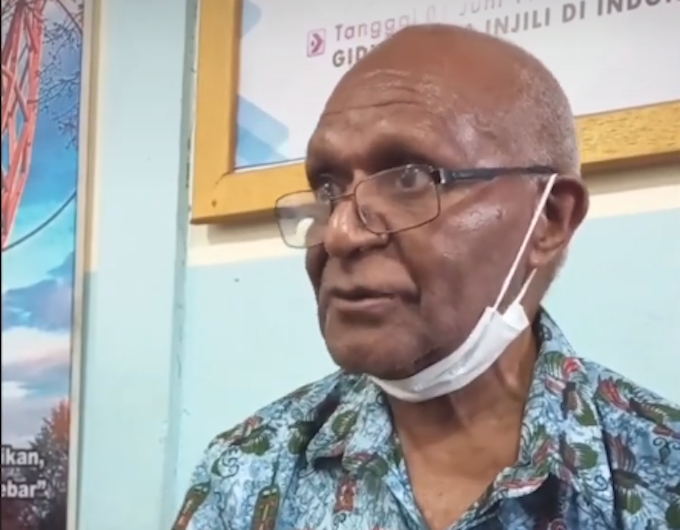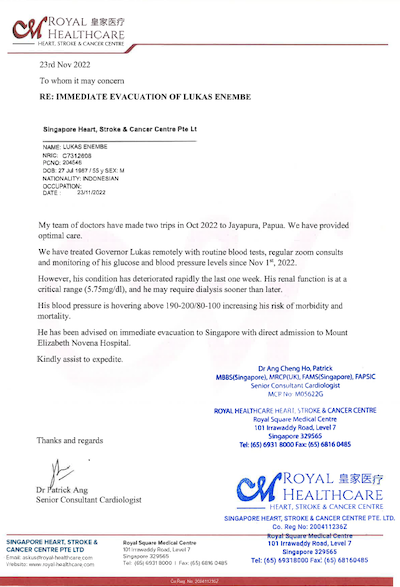ANALYSIS: By Yamin Kogoya
Following months of legal limbo and a health crisis, Papua Governor Lukas Enembe was arrested this week by the country’s Corruption Eradication Commission (KPK) in a dramatic move condemned by critics as a “kidnapping”.
At noon on Tuesday, January 10, Governor Enembe was dining in a local restaurant near the headquarters of Indonesia’s Mobile Brigade Corps, known as Brimob.
After the arrest the Brimob transported him directly to Sentani Theys Eluay airport — an airport named in honour of another prominent Papuan leader who was callously murdered by the same security forces in 2002, not far from where the governor was arrested.
- READ MORE: KPK arrests Papua Governor Lukas Enembe
- Papua governor Enembe arrested on ‘lavish’ bribery charges
- Fate of Papua’s Governor Enembe – the ‘son of Koteka’ – lies in balance amid allegations
- Other Governor Enembe reports
Governor Enembe was immediately flown to Jakarta to arrive at the Army Central Hospital (RSPAD), Gatot Soebroto, Central Jakarta, reports Kompas.com.
In what seems to be a cautiously premeditated arrest, Jakarta targeted Governor Enembe while he was alone and without the support of thousands of Papuans who had barricaded his residence since September last year.
Once the news of his arrest was leaked, supporters attempted to gather in Sentani at the airport, but they were outnumbered by heavy security forces. A few protesters were shot, and several were injured, with one protester dying from his injuries.
1 shot dead, several wounded
Papua Police Public Relations Officer Kombes Ignatius Benny Prabowo said when contacted by Tribunnews.com in Jakarta: “Yes, it is true that someone was shot dead on Tuesday.”
Among those who were shot were Hemanus Kobari Enembe (dead), Neiron Enembe, Kano Enembe, and Segira Enembe.
Surprisingly, they share the same clan names of the governor himself, indicating that only his immediate family were informed of his arrest.
Hemanus Kobari Enembe paid the ultimate price at the hand of Jakarta’s calculated planning and arrest of Papua’s governor.
The crisis began in September 2022, when Governor Enembe was named a suspect by the KPK and summoned by Brimob after it accused him of receiving bribes worth 1 million rupiah (NZ$112,000). This amount was then escalated into a rush of accusations against the governor, including a new allegation that the governor had paid US$39 million to overseas casinos, disclosing details of his private assets such as cars, houses, and properties.

Voices of prominent Papuan figures
A prominent Papuan, Natalius Pigai, Indonesia’s former human rights commissioner, was interviewed on January 11 by an INews TV news presenter regarding these extra allegations.
“If that’s the case,” Pigai replied, “then why don’t we use these wild extra allegations to investigate all the crimes committed in this country by the country’s top ministerial level, including the children of the president, as a conduit for investigating some of the crimes committed by his office in this country?
“Are we interested in that? Why just target Governor Lukas?”

Papuan public intellectual Dr Benny Giay was seen in a video saying that the arrest of Governor Enembe by the KPK in Jayapura was to serve the interests of Jakarta’s political elite, whom he described as “hardliners” in relation to the power struggle to become number one in Papua’s province.
According to him, Governor Lukas Enembe was a victim of this power struggle.
Dr Socrates Yoman, president of the West Papua Fellowship of Baptist Churches, described the arrest as a “kidnapping”. He said the governor had been arrested illegally, without following any legal procedures — and neither the governor nor legal counsel was informed of his arrest.
According to Dr Yoman, Governor Enembe is ill and in the process of recovering from his illness. Thus, this pressure exerted by the state through the military and police violated Governor Enembe’s basic rights to health and humanity.
The behaviour of the state through BRIMOB constituted a crime against humanity or a gross violation of human rights because the governor was arrested during lunchtime without an arrest warrant and while he was unwell, he said.
“The governor is not a terrorist — he was elected Governor of Papua by the Papuan people.
“This kidnapping shows that the nation or country has no law. The country is controlled by people who have lost their humanity, opting instead for animalistic rage and a senseless lust for violence.
“Our goal is to restore their humanity so that they can see other human beings as human beings and become whole human beings,” said Dr Yoman.
The governor’s health
The governor’s health has deteriorated since he was banned from traveling to Singapore for regular medical aid since September last year.

Last October, Governor Enembe received two visits from Singapore medical specialists who have been treating him for a number of years.
Despite these visits, his health has continued to deteriorate, which led Singapore’s medical specialists to send a letter in November to authorities in Indonesia requesting that the governor be airlifted to Mount Elizabeth hospital.
The letter from Royal Healthcare in Singapore said:
“We have treated Governor Lukas remotely with routine blood tests, regular zoom consults and monitoring of his glucose and blood pressure levels since November 1, 2022. However, his condition has deteriorated rapidly the last week. His renal function is at a critical range (5.75mg/dl), and he may require dialysis sooner than later. His blood pressure is hovering 190-200/80-100 increasing his risk of morbidity and mortality. He has been advised on immediate evacuation to Singapore with direct admission to Mount Elizabeth Novena Hospital.”
The letters were ignored, and the sick governor was arrested and taken to a hospital in Jakarta, where he had previously refused to go.
Governor Enembe had previously written to KPK requesting that he receive urgent medical treatment in Singapore. Papuan police chiefs and KPK members were asked to accompany him, but this did not happen.
On November 30, 2022, Firli Bahuri, Chairman of KPK, visited the governor at his barricaded residence in Koya Jayapura, Papua, in what appeared to be a humane approach.
But what happened on Tuesday indicates that KPK had already decided to arrest him and take him to the Indonesian capital of Jakarta — almost 4500 km from his home town.
Many Papuan figures who go to Jakarta return home in coffins. Papuan protesters did not want their leader to be taken out of Papua, partly due to this fear.
Despite these protests, letters, and requests, Jakarta completely disregarded the will of the people and of the governor himself.
The plot to kidnap Governor Enembe appears to have been well planned over a period of four months since September, providing enough space for the situation in Papua to calm down and allowing the governor to leave his barricaded house alone without his Papuan “special forces”.
It was during the lunch hour of noon on Tuesday that KPK targeted him in a cunningly calculated manner.
Governor’s image in social media
Governor Enembe is portrayed in the Indonesia’s national narrative as a representative of the so-called “poor and backward” majority of Papuans, while portraying him as a man of a lavish lifestyle, owning properties and cars, and with great wealth.
Comments on social media are flooded with a common theme — portraying Papua’s governor as a “criminal”, with some even calling for his “execution”.
Some social media comments emerging from those fighting for West Papua’s liberation are echoing these themes by claiming that Governor Enembe’s case has nothing to do with the Free Papua Movement– his problem is with Jakarta only as he is a “colonial puppet ruler”.
It is true that Lukas Enembe is governor of Indonesian settler colonial provinces. However, Papuans have failed to understand the big picture — the ultimate fate of West Papua itself.
What would happen if West Papua remains part of Indonesia for the next 20-50 years?
Our failure to see the big picture by both Papuans and Indonesians, as well as the international community, is a result of Jakarta fabrication that West Papua is merely a national sovereignty issue for Indonesia. That is the crux of that fatal error.
The isolation of the governor from the rest of the Papuans as a “corruptor” and other dehumanising labels are designed to destroy Papuans’ self-esteem, stripping them of their pride, dignity, and self-respect.
The images and videos of the governor’s arrest, deportation, handcuffing in Jakarta in KPK uniform, and his admission to the military hospital while surrounded by heavily armed security forces are psychologically intimidating to Papuans.
Through brutal silence, politically loaded imagery has been used to convey a certain message:
“See what has happened to your respected leader, the big chief of the Papuan tribes; he is no longer a person. Jakarta still has the final say in what happens to all of you.”
Papuans are facing a highly choreographed state-sponsored terror campaign that shows no signs of abating.
For Papuans, the new year of 2023 should be a time of hope, new dreams, and new lives, but this has been marred once again by the arrest and kidnapping of a well-known and popular Papuan figure, as well as the death of a member of the governor’s family on Tuesday.
As human miseries continue to unfold in the Papuan homeland, Jakarta continues to conduct business as usual, pretending nothing is happening in West Papua while beating the drum of “development, prosperity, and progress” for the betterment of the backward Papuans.
With such prolonged tragedies, it is imperative that the old theories, terminologies, and paradigms that govern this brutal state of affairs be challenged.
A new paradigm is needed
The very foundation of our thinking between West Papua and Indonesia must be re-examined within the framework of what Tunisian writer, Albert Memmie, described as “coloniser and colonised”, when examining French treatment of colonised Tunisians, who emerged concurrent with Franz Fanon, the leading thinker of black experience in white, colonised Algeria.
The works of these thinkers provide insight into how the world of colonisers and colonised operates with its psychopathological manipulations in an unjust racially divided system of coloniser control.
These great decolonisation literature treasures will help Papuans to connect the dots of this last frontier to a bigger picture of centuries of war against colonised original peoples around the world, some of which were obliterated (Tasmania), able to escape (Algeria), or escaped but are still trying to reorganise themselves (Haiti).
Therefore, the coloniser and colonised paradigm is a useful mental framework to view Jakarta’s settler colonial activities and how Papuans (colonised) are continuously being lied to, manipulated, dissected, remade and destroyed — from all sides — in order to prevent them from uniting against the entity that threatens their very existence.
The real culprits in West Papua and proper Papuan justice
Most ordinary Papuans are unable to gain access to information regarding who exploits their natural resources, how much they are making, who receives the most benefits and how or why.
But Jakarta is too busy displaying Governor Enembe’s personal affairs and wild allegations in headline news — his entire existence is placed on public display, as an object of humiliation, just as the messianic Jesus was crucified on a Roman cross in order to convince Galilean followers that their beloved leader failed.
Let us not forget, however, that it was this publicly humiliated and crucified Jesus who forever changed the imperial world order and human history.
If true justice is to be delivered to colonised Papuans, then Papuans must put the Dutch on trial for abandoning them 60 years ago, and then hold the United Nations and the United States responsible for selling them, to Indonesia, 60 years ago.
In addition to arresting all international capitalist bandits that are exploiting West Papua under the disguise of multinational corporations, Indonesia should also be arrested for its crimes against Papuans, dating back over 61 years.
However, the question remains… who will deliver this proper justice for the colonised Papuans? Jakarta has certainly set itself on a pathological path of arresting, imprisoning, and executing any figure that appears to be a messianic figure to unite these dislocated original tribes for its final war for survival.
Yamin Kogoya is a West Papuan academic/activist who has a Master of Applied Anthropology and Participatory Development from the Australian National University and who contributes to Asia Pacific Report. From the Lani tribe in the Papuan Highlands, he is currently living in Brisbane, Queensland, Australia.
This post was originally published on Asia Pacific Report.